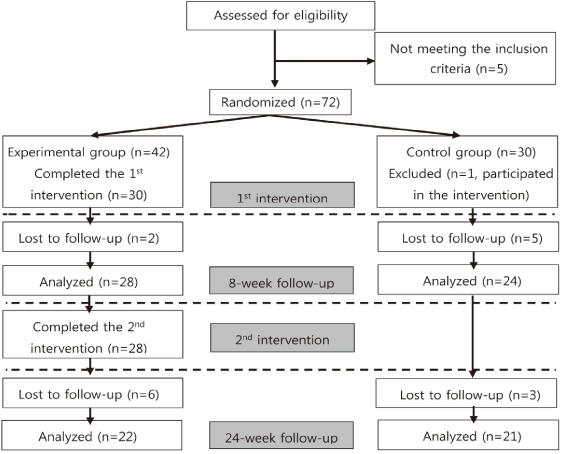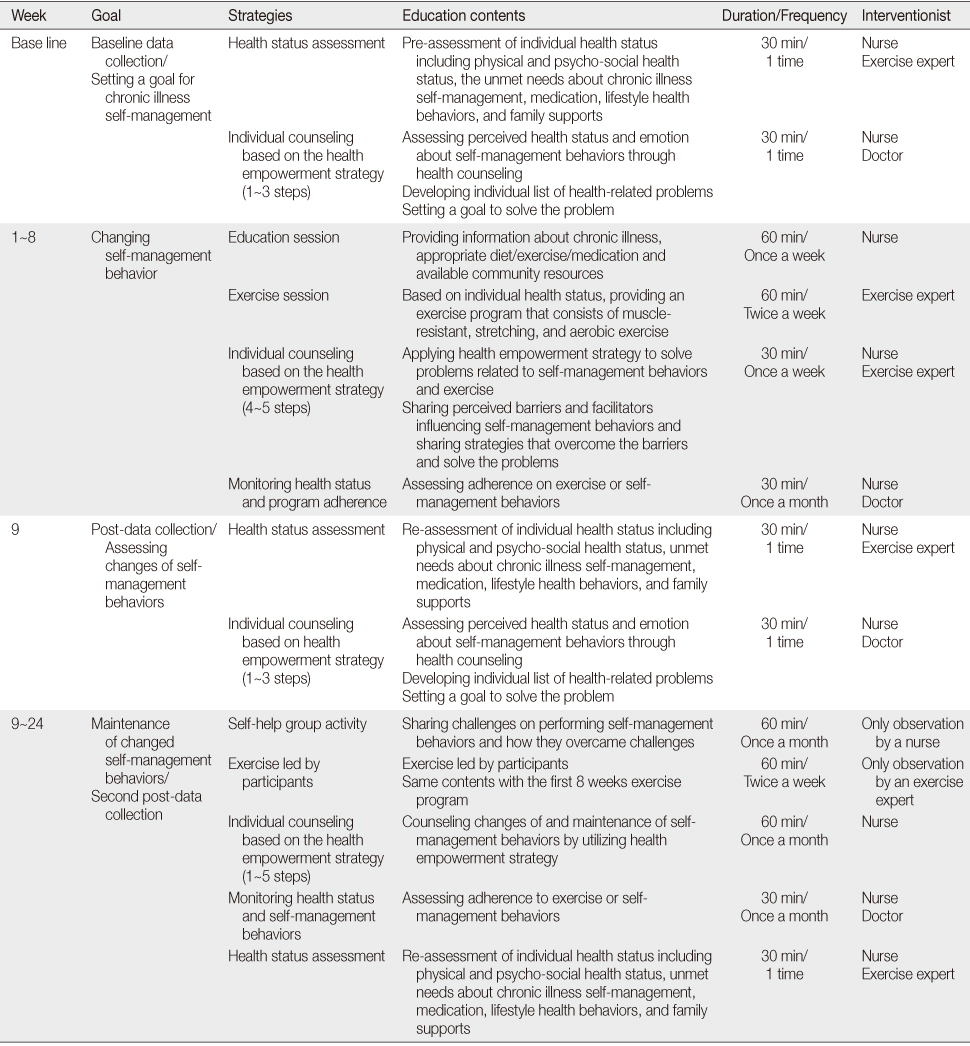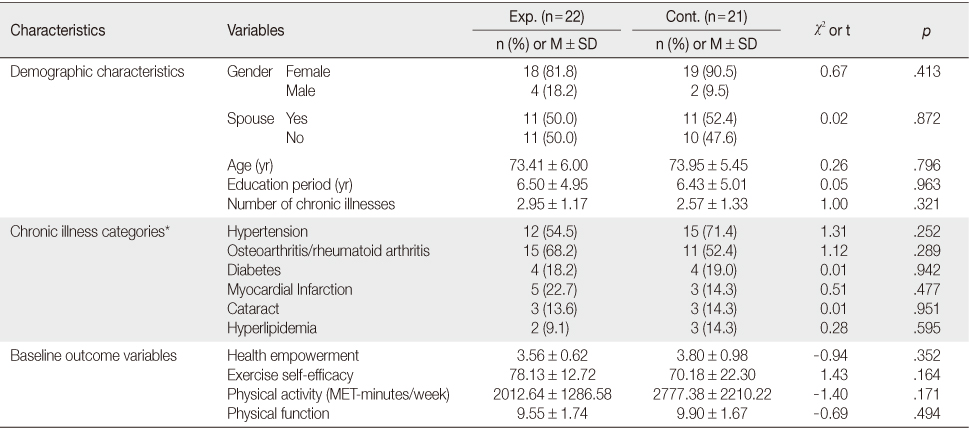Articles
- Page Path
- HOME > J Korean Acad Nurs > Volume 45(2); 2015 > Article
-
Original Article
- Effects of a Multi-disciplinary Approached, Empowerment Theory Based Self-management Intervention in Older Adults with Chronic Illness
- Chorong Park, Misoon Song, Belong Cho, Jaeyoung Lim, Wook Song, HeeKyung Chang, Yeon-Hwan Park
-
Journal of Korean Academy of Nursing 2015;45(2):192-201.
DOI: https://doi.org/10.4040/jkan.2015.45.2.192
Published online: April 30, 2015
1Yale School of Nursing, New Haven, U.S.A.
2College of Nursing·The Research Institute of Nursing Science, Seoul National University, Seoul, Korea.
3Department of Family Medicine, College of Medicine, Seoul National University, Seoul, Korea.
4Department of Rehabilitation Medicine, College of Medicine, Seoul National University, Seoul, Korea.
5Department of Physical Education, Seoul National University, Seoul, Korea.
6Seoul Women's College of Nursing, Seoul, Korea.
- Address reprint requests to: Park, Yeon-Hwan. RM 509, College of Nursing, Seoul National University, 103 Daehak-ro, Jongno-gu, Seoul 110-799, Korea. Tel: +82-2-740-8846, Fax: +82-2-765-4103, hanipyh@snu.ac.kr
© 2015 Korean Society of Nursing Science
This is an Open Access article distributed under the terms of the Creative Commons Attribution NoDerivs License. (http://creativecommons.org/licenses/by-nd/4.0/) If the original work is properly cited and retained without any modification or reproduction, it can be used and re-distributed in any format and medium.
Abstract
-
Purpose
- The purpose of this study was to develop a multi-disciplinary self-management intervention based on empowerment theory and to evaluate the effectiveness of the intervention for older adults with chronic illness.
-
Methods
- A randomized controlled trial design was used with 43 Korean older adults with chronic illness (Experimental group=22, Control group=21). The intervention consisted of two phases: (1) 8-week multi-disciplinary, team guided, group-based health education, exercise session, and individual empowerment counseling, (2) 16-week self-help group activities including weekly exercise and group discussion to maintain acquired self-management skills and problem-solving skills. Baseline, 8-week, and 24-week assessments measured health empowerment, exercise self-efficacy, physical activity, and physical function.
-
Results
- Health empowerment, physical activity, and physical function in the experimental group increased significantly compared to the control group over time. Exercise self-efficacy significantly increased in experimental group over time but there was no significant difference between the two groups.
-
Conclusion
- The self-management program based on empowerment theory improved health empowerment, physical activity, and physical function in older adults. The study finding suggests that a health empowerment strategy may be an effective approach for older adults with multiple chronic illnesses in terms of achieving a sense of control over their chronic illness and actively engaging self-management.
- 1. Chung K, Lee YK, Lee SJ, Lee YH. Analysis of the survey of living conditions and welfare needs of Korean older persons. Seoul: Korea Institute for Health and Social Affairs; 2012.Report No.: Research Report 2012-47-14.
- 2. Centers for Disease Control and Prevention. Deaths and mortality [Internet]. Atlanta, GA, Author. 2012;cited 2014 July 7. Available from: http://www.cdc.gov/nchs/fastats/deaths.htm
- 3. Norris SL, High K, Gill TM, Hennessy S, Kutner JS, Reuben DB, et al. Health care for older Americans with multiple chronic conditions: A research agenda. J Am Geriatr Soc. 2008;56(1):149–159. ArticlePubMed
- 4. Bodenheimer T, Wagner EH, Grumbach K. Improving primary care for patients with chronic illness: The chronic care model, Part 2. JAMA. 2002;288(15):1909–1914.ArticlePubMed
- 5. Jordan JE, Briggs AM, Brand CA, Osborne RH. Enhancing patient engagement in chronic disease self-management support initiatives in Australia: The need for an integrated approach. Med J Aust. 2008;189:10 Suppl. S9–S13.ArticlePubMedPDF
- 6. Huffman M. Health coaching: A new and exciting technique to enhance patient self-management and improve outcomes. Home Healthc Nurse. 2007;25(4):271–274. PubMed
- 7. Newman SP. Chronic disease self-management approaches within the complex organisational structure of a health care system. Med J Aust. 2008;189:10 Suppl. S7–S8.ArticlePubMedPDF
- 8. Anderson RM, Funnell MM. Patient empowerment: Reflections on the challenge of fostering the adoption of a new paradigm. Patient Educ Couns. 2005;57(2):153–157. ArticlePubMed
- 9. Tang TS, Funnell MM, Brown MB, Kurlander JE. Self-management support in "real-world" settings: An empowerment-based intervention. Patient Educ Couns. 2010;79(2):178–184. ArticlePubMed
- 10. Rogers ES, Chamberlin J, Ellison ML, Crean T. A consumer-constructed scale to measure empowerment among users of mental health services. Psychiatr Serv. 1997;48(8):1042–1047.ArticlePubMed
- 11. Shearer NB. Health empowerment theory as a guide for practice. Geriatr Nurs. 2009;30:2 Suppl. 4–10. ArticlePubMedPMC
- 12. Anderson RM, Funnell MM, Aikens JE, Krein SL, Fitzgerald JT, Nwankwo R, et al. Evaluating the efficacy of an empowerment-based self-management consultant intervention: Results of a two-year randomized controlled trial. Ther Patient Educ. 2009;1(1):3–11. ArticlePubMedPMC
- 13. Bandura A. Self-efficacy: Toward a unifying theory of behavioral change. Psychol Rev. 1977;84(2):191–215.ArticlePubMed
- 14. Moattari M, Ebrahimi M, Sharifi N, Rouzbeh J. The effect of empowerment on the self-efficacy, quality of life and clinical and laboratory indicators of patients treated with hemodialysis: A randomized controlled trial. Health Qual Life Outcomes. 2012;10:115ArticlePubMedPMC
- 15. Pellino T, Tluczek A, Collins M, Trimborn S, Norwick H, Engelke ZK, et al. Increasing self-efficacy through empowerment: Preoperative education for orthopaedic patients. Orthop Nurs. 1998;17(4):48–51.PubMed
- 16. Royani Z, Rayyani M, Behnampour N, Arab M, Goleij J. The effect of empowerment program on empowerment level and self-care self-efficacy of patients on hemodialysis treatment. Iran J Nurs Midwifery Res. 2013;18(1):84–87.PubMedPMC
- 17. Anderson RM, Fitzgerald JT, Gruppen LD, Funnell MM, Oh MS. The diabetes empowerment scale-short form (DES-SF). Diabetes Care. 2003;26(5):1641–1642.ArticlePDF
- 18. Bernard M. Promoting health in old age: Critical issues in self health care. Buckingham, UK: Open University Press; 2000.
- 19. de Vries NM, van Ravensberg CD, Hobbelen JS, Olde Rikkert MG, Staal JB, Nijhuis-van der Sanden MW. Effects of physical exercise therapy on mobility, physical functioning, physical activity and quality of life in community-dwelling older adults with impaired mobility, physical disability and/or multi-morbidity: A meta-analysis. Ageing Res Rev. 2012;11(1):136–149. ArticlePubMed
- 20. Centers for Disease Control and Prevention. How much physical activity do older adults need?: Physical activity is essential to healthy aging [Internet]. Atlanta, GA, Author. 2014;cited 2014 July 7. Available from: http://www.cdc.gov/physicalactivity/everyone/guidelines/olderadults.html
- 21. Centers for Medicare & Medicaid Services. Chronic conditions data warehouse: Condition categories [Internet]. Baltimore, MD, Author. 2011;cited 2014 July 7. Available from: https://www.ccwdata.org/web/guest/condition-categories
- 22. Park C, Park YH. Validity and reliability of Korean version of health empowerment scale (K-HES) for older adults. Asian Nurs Res. 2013;7(3):142–148. Article
- 23. Gortner SR, Jenkins LS. Self-efficacy and activity level following cardiac surgery. J Adv Nurs. 1990;15(10):1132–1138.ArticlePubMed
- 24. Gu MO. A structural model for self care behavior and metabolic control in diabetic patient [dissertation]. Seoul, Seoul National University. 1992.
- 25. Chun MY. Validity and reliability of Korean version of international physical activity questionnaire short form in the elderly. Korean J Fam Med. 2012;33(3):144–151. ArticlePubMedPMC
- 26. Guralnik JM, Simonsick EM, Ferrucci L, Glynn RJ, Berkman LF, Blazer DG, et al. A short physical performance battery assessing lower extremity function: Association with self-reported disability and prediction of mortality and nursing home admission. J Gerontol. 1994;49(2):M85–M94.ArticlePubMed
- 27. Brown SA, Garcia AA, Kouzekanani K, Hanis CL. Culturally competent diabetes self-management education for Mexican Americans: The starr county border health initiative. Diabetes Care. 2002;25(2):259–268.PubMed
- 28. Chang AK, Fritschi C, Kim MJ. Nurse-led empowerment strategies for hypertensive patients with metabolic syndrome. Contemp Nurse. 2012;42(1):118–128. ArticlePubMed
- 29. Manini TM, Pahor M. Physical activity and maintaining physical function in older adults. Br J Sports Med. 2009;43(1):28–31. ArticlePubMed
REFERENCES
Figure & Data
REFERENCES
Citations

- Co‐development of frailty and functional ability in older adults: A parallel‐process latent growth curve model
Jiaqi Yu, Linhan Wang, Ziyi Wang, Shuyu Chen, Yanyan Li, Wendie Zhou, Cuili Wang
Geriatrics & Gerontology International.2025; 25(9): 1223. CrossRef - Guidance and psychological counseling needs as the predictor of health empowerment in community-dwelling older adults: A cross-sectional design
Hülya Kulakçı Altıntaş, Nilay ERCAN-ŞAHİN
Educational Gerontology.2025; : 1. CrossRef - Application of nano-insoles on functional recovery in early postoperative period in intertrochanteric femur fractures
Xuexue Xu, Chongxue Zhu, Ya Zhu, Yumei Chen, Liya Jin
Materials Express.2024; 14(6): 968. CrossRef - Validation of the Chinese version of the ‘caring ability of family caregivers of patients with cancer scale (CAFCPCS)’ in family caregivers of elderly patients with cancer: A study protocol
Dongmei Zhuang, Yan Wang, Qin Chen, Ting Wang, Peng Zhou, Furong Zhu, Shaohua Hu
Nursing Open.2024;[Epub] CrossRef - The application effect of a pulmonary rehabilitation program based on empowerment theory for patients with COPD combined with heart failure
Yue Zhang, Chunfang Gu, Lin Sun, Huang Hai
Medicine.2024; 103(41): e40067. CrossRef - A Comprehensive Digital Self-care Support System for Older Adults With Multiple Chronic Conditions: Development, Feasibility, and Usability Testing of myHESTIA
Priya Nambisan, Kurt C. Stange, Kalle Lyytinen, Eva Kahana, Edmund Duthie, Michael Potnek
Journal of Applied Gerontology.2023; 42(2): 170. CrossRef - Outcomes of problem-based learning in nurse education: A systematic review and meta-analysis
Sapna Sharma, Ita Daryanti Saragih, Dame Elysabeth Tuty Arna Uly Tarihoran, Fan-Hao Chou
Nurse Education Today.2023; 120: 105631. CrossRef - Multimodal Diabetes Empowerment for Older Adults with Diabetes
Keumok Park, Youngshin Song
International Journal of Environmental Research and Public Health.2022; 19(18): 11299. CrossRef - Reliability and Validity of the Korean Version of the Health Care Empowerment Questionnaire (K-HCEQ)
Semi Lim, Kyungmi Lee
Journal of Korean Academy of Fundamentals of Nursing.2022; 29(2): 131. CrossRef - The effects of health empowerment and social support on health promotion behavior in older adults: A cross-sectional study
Kyungmi Lee, Semi Lim
Journal of Korean Gerontological Nursing.2022; 24(4): 433. CrossRef - Influence of Nursing Intervention Based on Risk Assessment Model on Self-Efficacy and Postoperative Rehabilitation of Surgical Patients
Yanfang Yang, Peng Chen, Cuili Jiao, Deepak Kumar Jain
Journal of Healthcare Engineering.2022; 2022: 1. CrossRef - Developing Domains and Items about Self-Management among Elderly People with Chronic Disease
Gain Shin, Hae Yean Park
Healthcare.2021; 10(1): 54. CrossRef - Validity and Reliability of the Korean Version of the Partners In Health Scale (PIH-K)
Mi-Kyeong Jeon, Jung-Won Ahn, Yeon-Hwan Park, Mi-Kyoung Lee
Journal of Korean Critical Care Nursing.2019; 12(2): 1. CrossRef - Effects of a Health Promotion Empowerment Program Using a Resident Volunteer as a Lay Health Leader on Frail Elders' Health and Empowerment
Jeong Sook Park, Yun Jung Oh
Journal of Korean Academy of Community Health Nursing.2018; 29(3): 335. CrossRef - The Influence of Self-care Behaviors, Empowerment and Social Support on Glycosylated Hemoglobin in Patients with Type 2 Diabetes
Hwa Kyung Oh, Eun Ju Lee
Journal of Korean Academy of Community Health Nursing.2017; 28(2): 216. CrossRef - Health Empowerment of Older Adults with High-risk of Cardio-cerebrovascular Diseases
HyoJin Son, Gwang Suk Kim
Journal of Korean Academy of Community Health Nursing.2017; 28(4): 410. CrossRef - Patient Education Competence Scale for Registered Nurses in Taiwan: Scale development and psychometric validation
Li‐Ying Lin, Ruey‐Hsia Wang
Japan Journal of Nursing Science.2017; 14(2): 117. CrossRef - A Review on the Use of Effect Size in Nursing Research
Hyuncheol Kang, Kyupil Yeon, Sang-Tae Han
Journal of Korean Academy of Nursing.2015; 45(5): 641. CrossRef

Figure 1
Description of Intervention
Baseline Characteristics of the Participants
*Multiple answers were allowed; Exp.=Experimental group; Cont.=Control group.
Changes in Outcome Variables from Baseline to 24-week Follow-up
*by one-way repeated measured ANOVA; †by mixed ANOVA; ‡Effect size; Exp.=Experimental group (n=22); Cont.=Control group (n=21).
*Multiple answers were allowed; Exp.=Experimental group; Cont.=Control group.
*by one-way repeated measured ANOVA; †by mixed ANOVA; ‡Effect size; Exp.=Experimental group (n=22); Cont.=Control group (n=21).
 KSNS
KSNS
 E-SUBMISSION
E-SUBMISSION




 Cite
Cite

